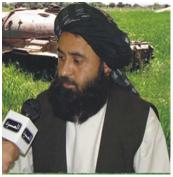Pakistan detains Taliban shadow governor of Kunduz
 |
| Kunduz shadow governor Mullah Abdul Salam. |
I request the Taliban to lay down their arms and the government will solve their problem. They have lost commanders … who were captured. It is time for them to stop fighting.
Pakistan’s military intelligence service, aided by the CIA, has captured the shadow Taliban governor of Afghanistan’s Kunduz province during a raid in the city of Faisalabad.
Mullah Abdul Salam was detained during a joint raid by the Inter-Services Intelligence agency and the CIA one week ago in the eastern province of Punjab, Pakistani and US intelligence officials told Newsweek.
Salam was detained along with three other Taliban operatives as they were planning to meet with Mullah Abdul Ghani Baradar, the Afghan Taliban’s operational commander and the top deputy to Mullah Omar, who was captured more than 10 days ago in Karachi. The Taliban and the Pakistani military have confirmed that Baradar was captured.
Salam is considered a dangerous and effective commander. He is currently number one on the Coalition’s 10-most-wanted list for Kunduz province. Salam takes direct orders from the Quetta Shura, the Taliban’s executive council, which is based in Pakistan and was led by Baradar before his capture.
Afghan security officials previously claimed that Salam was killed during a series of clashes in Kunduz in early September 2009 that resulted in the deaths of than 90 Taliban and Central Asian fighters. The Taliban denied the reports of Salam’s death.
Kunduz has been the hub of Taliban activity in the north as the group seeks to pressure the Afghan government from a region previously thought to be secure. The Islamic Movement of Uzbekistan (IMU), a grouping of al Qaeda-backed Central Asia extremists, is known to operate in Kunduz with the local Taliban.
A strong Taliban presence in Kunduz has led to the interdicting of NATO supply lines from Tajikistan. A Taliban presence in Kunduz also puts the Taliban on the border with the Central Asian nations.
Three districts in Kunduz – Chahara Dara, Dashti Archi, and Iman Sahib – are considered contested between the Taliban, and Afghan and Coalition forces. Two districts in neighboring Baghlan province – Baghlan-i-Jadid and Burka – are under the control of the Taliban [see Threat Matrix report, Afghanistan’s wild-wild North].
The captures of Baradar and Salam appear to signal a shift in the Pakistani government’s attitude toward the Afghan Taliban. In the past, the US and other Western countries have accused the Pakistani military of directly aiding the Afghan Taliban, or of looking the other way as the Quetta Shura operates freely. As recently as the fall of 2009, US officials have accused senior ISI officers of sitting in on Taliban planning and strategy sessions, The Wall Street Journal reported.
It is unclear if the arrests of Baradar and Salam represent a true shift in policy regarding the Afghan Taliban, or if the Pakistani government and military have facilitated the arrests in order to secure control of potential negotiations between the Afghan Taliban and the Afghan government, while currying favor with the US. Baradar is said to have been amenable to talks with the Afghan government; his removal from the Taliban leadership would put Pakistan in the driver’s seat as the primary broker in any negotiations.
US officials have accused the ISI of knowing the exact locations of members of the Quetta Shura and other senior Taliban commanders. If the Pakistanis have changed their outlook on the Afghan Taliban, then more arrests should be forthcoming.